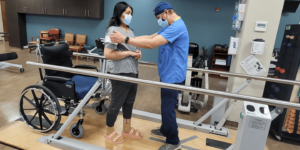1. Introduction to Physical Therapy
When injuries or health conditions affect our ability to move and function properly, physical therapy emerges as a crucial solution. It involves various exercises, stretches, and techniques aimed at restoring mobility, reducing pain, and improving overall physical health.
2. Importance of Physical Therapy
Rehabilitation After Injury
Physical therapy plays a pivotal role in the rehabilitation process post-injury. Whether it’s a sports-related injury, a workplace accident, or a surgical procedure, undergoing targeted physical therapy helps individuals regain strength and flexibility, facilitating a quicker return to normal activities.
Pain Management
Chronic pain can significantly impact one’s daily life. Physical therapy offers non-invasive methods to manage and alleviate pain, reducing the reliance on medications and promoting natural healing processes within the body.
Improving Mobility
For individuals dealing with mobility issues due to aging, disability, or illness, physical therapy offers tailored interventions to enhance movement and independence. By targeting specific muscles and joints, therapists assist in restoring balance, coordination, and functional abilities.
3. Understanding Physical Therapy in Houston

Availability of Services
In a bustling city like Houston, access to quality healthcare services, including physical therapy, is abundant. From downtown districts to suburban neighborhoods, numerous clinics and facilities offer comprehensive rehabilitation programs tailored to individual needs.
Qualified Professionals
Houston boasts a diverse community of healthcare professionals, including skilled physical therapists. These professionals hold advanced degrees and certifications, ensuring expertise in assessing, diagnosing, and treating a wide range of musculoskeletal and neurological conditions.
Specialized Treatment Options
From sports medicine to geriatric care, physical therapy in Houston encompasses various specialties to address specific patient requirements. Whether it’s aquatic therapy, pediatric rehabilitation, or post-surgical recovery, clinics offer specialized programs tailored to each patient’s unique needs.
4. Choosing the Right Physical Therapy Clinic
Location and Accessibility
When selecting a physical therapy clinic in Houston, proximity and accessibility are crucial factors to consider. Opting for a clinic located conveniently to your home or workplace ensures regular attendance and minimizes transportation challenges.
Reputation and Reviews
Researching the reputation and reading reviews of potential clinics provides valuable insights into the quality of care and patient satisfaction. Online platforms and word-of-mouth recommendations help gauge the clinic’s reliability and effectiveness in achieving desired outcomes.
Insurance Coverage
Before committing to a physical therapy program, it’s essential to verify insurance coverage and understand associated costs. Many clinics in Houston accept various insurance plans, making rehabilitation services accessible and affordable for patients.
5. What to Expect During Physical Therapy Sessions
Initial Assessment
The first step in physical therapy involves a comprehensive assessment of the patient’s medical history, current condition, and treatment goals. This evaluation guides the development of a personalized treatment plan tailored to address specific needs and objectives.
Customized Treatment Plan
Physical therapists design individualized treatment plans comprising exercises, manual therapy techniques, and modalities to address the patient’s unique needs and challenges. These sessions focus on improving strength, flexibility, balance, and overall functional capacity.
Progress Tracking
Throughout the rehabilitation process, therapists monitor and track the patient’s progress, adjusting treatment strategies as necessary to optimize outcomes. Regular assessments and objective measurements ensure accountability and motivate patients to achieve their rehabilitation goals.
6. Benefits of Physical Therapy in Houston
Faster Recovery
By receiving targeted interventions and personalized care, individuals undergoing physical therapy in Houston experience accelerated recovery times, allowing them to resume daily activities and return to their pre-injury or pre-illness levels of function sooner.
Long-term Health Improvement
Beyond immediate rehabilitation goals, physical therapy fosters long-term health improvements by promoting lifestyle changes, injury prevention strategies, and ongoing maintenance exercises. Patients develop sustainable habits that support overall well-being and minimize the risk of future injuries.
Enhanced Quality of Life
The holistic approach of physical therapy not only addresses physical impairments but also improves mental health and emotional well-being. Through education, support, and empowerment, patients in Houston achieve a higher quality of life, with restored confidence and independence.
7. Conclusion
Physical therapy serves as a cornerstone of rehabilitation, offering effective solutions for individuals seeking to recover from injuries, manage pain, and enhance their overall physical function. In Houston, a vibrant healthcare landscape ensures access to quality services delivered by skilled professionals, empowering individuals to regain mobility, alleviate discomfort, and reclaim their active lifestyles.
FAQs
1. How long does a typical physical therapy session last? Physical therapy sessions typically last between 30 minutes to an hour, depending on the patient’s needs and treatment plan.
2. Is physical therapy painful? While some therapeutic techniques may cause temporary discomfort, physical therapy aims to alleviate pain and improve function. Therapists work closely with patients to ensure treatments are tolerable and effective.
3. How many sessions of physical therapy will I need? The number of sessions required varies depending on the severity of the condition, individual response to treatment, and specific rehabilitation goals. Your therapist will outline a personalized plan tailored to your needs.
4. Can I benefit from physical therapy if I’m not injured? Absolutely! Physical therapy offers preventive benefits by addressing imbalances, weaknesses, and movement dysfunctions before they escalate into injuries. Regular therapy sessions can help maintain optimal physical health and performance.
5. Will my insurance cover physical therapy expenses? Many insurance plans cover physical therapy services, but coverage varies depending on your policy. It’s advisable to check with your insurance provider to understand your benefits and any out-of-pocket expenses you may incur.






















